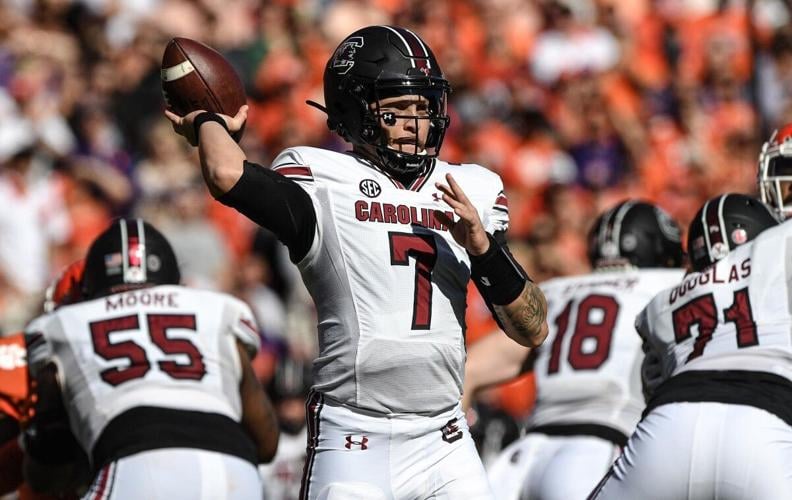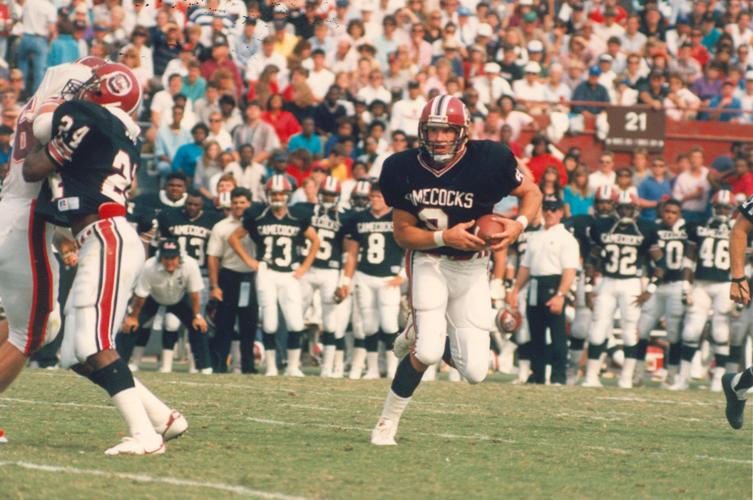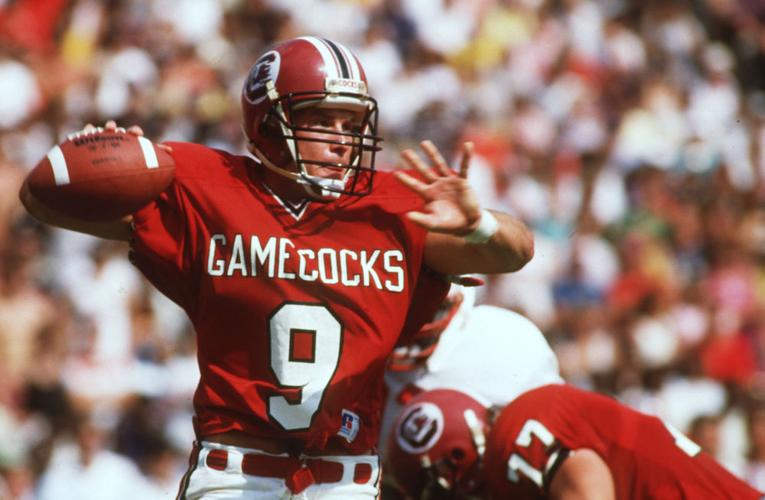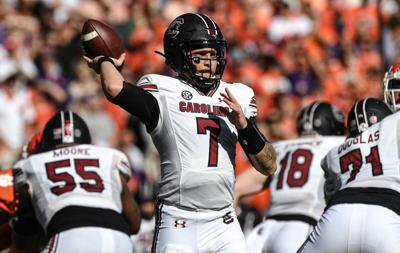COLUMBIA — Sometime over the next three days, South Carolina’s Spencer Rattler will hear his name called as the latest quarterback drafted into the NFL. After a sublime two seasons with the Gamecocks, Rattler will head to the next level, hoping for a sooner-rather-than-later chance to get on the field and show what he can do.
He will also rid South Carolina, and the man who never wanted to be the answer to it, of a bothersome trivia question.
When was the last time a South Carolina quarterback was drafted into the NFL?
“It’s shocking to me, particularly when I look at some comparable traits of quarterbacks that have come out since me, compared to my skill set in 1990,” said Todd Ellis, the Gamecocks’ career passing leader. “It is shocking.”
It’s been 34 years since Ellis was picked in the ninth round of the 1990 NFL Draft as selection No. 247. He was taken by the Denver Broncos, coached by the late Dan Reeves, himself a former Gamecock quarterback.
Looking at the notable names that followed Ellis under center at USC, it’s easy to agree with Ellis’ assessment. The Gamecocks have had QBs make it to the NFL — Anthony Wright spent close to a decade in the league, Connor Shaw worked with current offensive coordinator Dowell Loggains in Cleveland and Chicago, starting one game in 2014 — but they were either undrafted free agents or played at other positions as pros.
But no QB since Ellis has been drafted, and he’s one of only four USC QBs to get drafted (Ed Pasky, 1951; Johnny Gramling, 1954; Jeff Grantz, 1976). Like the others, Ellis’ pro experience was fleeting.

Todd Ellis still holds several USC passing records, including the Gamecocks' career passing mark.
Dream to nightmare
Entering his senior season in 1989, Ellis was considered one of the country’s best NFL prospects. Leaving USC as the seventh-leading career passer in NCAA history, Ellis’ size and strong right arm made him a commodity.
“Like everybody else, we all think we can play in the NFL. You’re not a good quarterback if you don’t believe you’re one of the best 5-10 in the country,” Ellis said. “I certainly felt I’d have a chance to play in the NFL.”
On Oct. 28, 1989, the future became much murkier.
Starting his 43rd consecutive game, Ellis took the third snap of the afternoon. Linebacker Mark Thomas led the N.C. State blitz and Ellis saw receiver Robert Brooks open.
The pass went wide. Ellis was hit just after he released on a play that legions of Gamecock fans still call dirty (Ellis has always said it was accidental, that Thomas got twisted and fell into him).
Whatever the label, Thomas collided with Ellis’ left knee and Ellis went down. The diagnosis was a torn MCL, ending his season and college career.
The thoughts about Ellis’ budding professional career immediately began.
Offseason
“There was an injury combine that year, for guys that had gotten hurt and couldn’t work out at the regular combine,” Ellis remembered. “I went to the regular combine, got the physical, but I wasn’t ready to run and I didn’t throw, either.”
He also held a late-spring Pro Day in Columbia where a few NFL teams showed up, Denver one of them. “I remember thinking, ‘I’m not 100 percent, but I’m pretty damn close,’ Ellis said. “I felt good throwing for him that day. But I also knew that in the NFL, it’s all about how much they have invested in you. Anybody would still be taking a risk.”
The draft, then a two-day, 12-round event, started on April 22. Ellis knew he wouldn’t be a high pick and was able to relax, listening to what his agent, former New England receiver Randy Vataha, told him.
If Ellis didn’t get drafted, that was almost better than being drafted late. That way, he’d have the ability to negotiate a free-agent deal with teams that really wanted him.
Names began flying off the board. Illinois QB Jeff George went first. Junior Seau and Emmitt Smith were first-rounders and Ellis’ USC teammate, Harold Green, went in the second round to Cincinnati.
In the ninth round, Denver’s pick was Todd Ellis.
“Of course I was ecstatic,” Ellis said. “Then later on, knowing they had John Elway and Gary Kubiak out there, I thought that Denver probably would not have been my first choice.”
(Coincidentally, Denver’s connection with USC helped land a tight end two rounds earlier. One of the receivers that helped Ellis set so many records at USC, Sterling Sharpe, had a little brother at Savannah State. The Broncos took Shannon Sharpe with the 192nd pick)
Ellis flew to Denver for pre-training camp the next day.

South Carolina quarterback Todd Ellis, who led the Gamecocks to back-to-back eight-win seasons in 1987 and '88, is the last Gamecock QB to be drafted into the NFL.
The league
Sporting No. 10 on his jersey, one up from the 9 he made legendary in four years at USC, Ellis was greeted with sour news. Normally, NFL teams could carry six-man developmental squads during the season, but shortly after the draft, owners had voted to eliminate them for 1990.
Now Ellis was competing to be a third QB on a team that had only carried two on its Super Bowl roster the season before, and one was Elway. Rutgers’ Scott Erney and UTEP’s Pat Hegarty were also in camp.
Ellis was working out, trying to get his knee back to 100 percent, getting as many consecutive reps as he could through preseason camp, with Sept. 9 the season-opener. As preseason games began, the Broncos had a Monday-night game against San Francisco, which had thrashed Denver 55-10 in the previous season’s Super Bowl.
Even in the preseason, Denver wanted that game. Reeves, who wasn’t shy about expressing his disdain for the 49ers organization, encouraged his team to make it a blood feud.
Then-quarterbacks coach Mike Shanahan told his charges that Elway would play the first quarter, Kubiak the second. Kubiak would start the third but the other three would draw straws to see who played after.
Ellis drew the long straw.
“We were up 24-10. Reeves sends me in after the 49ers punted, and tells me, ‘Move quick, keep the snap, protect the football,’” Ellis said. “We ran a running play for 1 yard on first down.”
On second down, Reeves signaled a base play, one receiver curling to the outside with a tight end out route to the same side. Ellis thought, “I’m getting the first down right here,” as he took his five-step drop and saw the seam.
“He slipped a bit out of the break. I let it go, it zipped past his earhole just as he’s about to get his arm up,” Ellis said. “Incomplete. I was so mad at myself.”
Third-and-long, the right guard dropped down and there was no avoiding the blitz. Ellis was sacked in a cloud of laundry.
The 49ers scored on that possession, and Kubiak replaced Ellis in what became a 27-24 loss. Two days later, Ellis was summoned to Reeves’ hotel room and told to bring his playbook.
“I asked him, ‘Do I need to pursue this further? Do I got what it takes?,’” Ellis recalled. “And he said yes. Whether he was truthful or he was protecting me, it was nice of him to say. But it’s tough.
“That was my NFL career.”
A different path
Ellis played a season for the Sacramento Surge of the World League of American Football. It was another case of being thankful for the opportunity, but also wondering what football God he’d angered.
Mike Elkins, also from Ellis’ hometown of Greensboro, N.C., had been drafted in 1989 by Kansas City. He was loaned to Sacramento to get some playing time since his rookie year was dominated by a back injury, and he was the only actual NFL QB in the league.
As such, there was pressure to play him. That left Ellis as his backup.
“A 10-game season, being in California, I’m starting to think, ‘Is this my window or not?,’” Ellis said. “Not playing all the time for whatever reason, you wonder if your window is closed now.”
Ellis came back to Columbia and never left, earning a degree from USC’s law school and opening a practice in Irmo. He began helping with sideline duties for USC football radio broadcasts and graduated to play-by-play in 2003.
He doesn’t have his Broncos jersey (at one time, there was a Gamecock antiques store in Columbia that had one, or at least a replica). He thinks he still has a Surge jersey, and came across a Surge football card in a desk drawer the other day.
Ellis isn’t bitter; he’s had a great life. But there’s always the wonder of what might have been had that receiver not slipped or he’d thrown the ball a bit later. Or, going back to the N.C. State game, if Thomas hadn’t fallen into his knee.
“It gave me massive perspective and appreciation for what it takes to be on an NFL roster for one day, much less a career,” Ellis said.
That brings it back to Rattler, who Ellis had the pleasure of seeing play the past two seasons.

Spencer Rattler left USC as its fifth all-time leading passer.
The slump-buster
Wright started 19 of his 31 career NFL games. Shaw just had the one.
Dylan Thompson made an active roster, but never played; Corey Jenkins, after playing quarterback at USC, was moved to safety for the final two games of his college career and drafted as a linebacker, playing 23 games at that spot for Miami.
Pasky, Gramling, Grantz nor Ellis never played a regular-season NFL down.
That’s the USC QB legacy in the NFL that Rattler is coiled to shatter.
“He has games where he looks like a first-round pick. He has games where he looks like a late-rounder, free agent-type quarterback,” draft guru Mel Kiper said during a draft special. “When he’s on, when he has got his best stuff? He is really good.”
Rattler left USC as its fifth-leading career passer despite only playing two seasons. Last year, with a patchwork offensive line and no running game to speak of, he threw for 3,186 yards with 19 touchdowns, helping turn receiver Xavier Legette into another hot NFL prospect.
Rattler is viewed as a second- or third-round prospect, a guy who can come in as a backup and learn before he has to play. That can be a blessing and a curse.
“I got a lot of experience, been in two big-time conferences. Been in three different offenses,” Rattler said on a recent podcast. “Quick learner, can go through multiple different offenses, and I feel like I’m a guy that gives his all when he’s on the field.”
The top three picks in the draft are all expected to be quarterbacks, starting with Southern Cal’s Caleb Williams, who was once Rattler’s understudy at Oklahoma. There could be four teams taking QBs within the first 10 picks, all looking for a franchise guy.
Rattler could be that guy, as he and Ellis were at USC. Ellis never got his chance to show it in the NFL but Rattler could.
“He had the finest year as a quarterback at South Carolina I’ve ever seen, and one of the finest since I’ve been playing or calling the games in the history of my career,” Ellis said. “I can’t wait to hopefully be that guy to say, ‘If he wasn’t in the Top 5, you better show me four Supermans and a Batman.’”
The advantage of being drafted in the later rounds means that Rattler can perhaps avoid the “no good team drafts first” pitfall. Maybe he lands somewhere where he can get a legitimate shot to play, instead of holding a clipboard for 2-3 years. Some mock drafts have him going to Denver, which would bring Ellis’ NFL journey back to the spotlight.
Rattler will become the new answer to the trivia question. Then if he gets a chance to play, it’s up to him to author the answer to a new question.
What South Carolina quarterback had the best NFL career?













